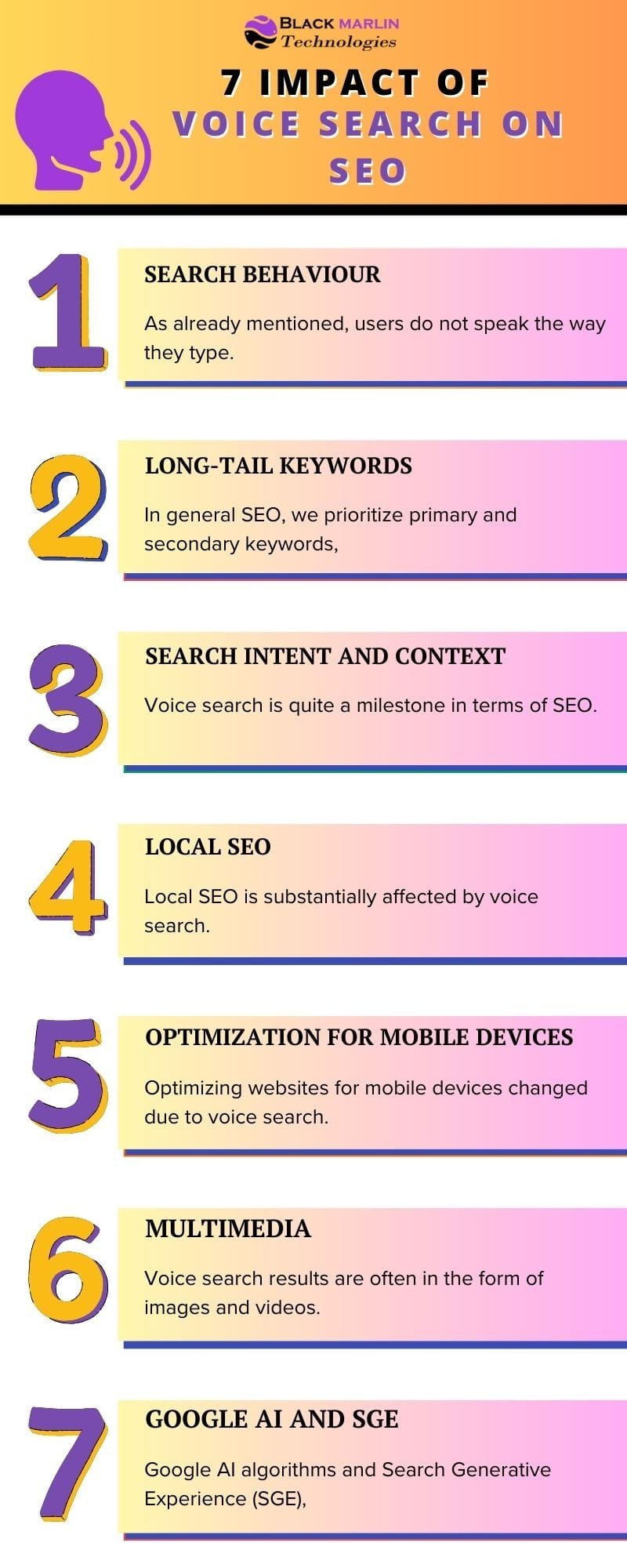“Hi Google, what is today’s weather update?”
“Hello Google, which is the best restaurant near me?”
The stimulating voice of Google Assistant instantly responds to your queries while displaying the top results on the smartphone screen. So, how fast do you think the digital realm is changing?
According to statistics, 27% of mobile phone users use voice search, and a whopping 57% of the users rely on it to find local businesses (Yaguara).
Another number will add more juice to the above statement- 50% of adults worldwide use voice search every day (Yaguara)!
No wonder voice search SEO has become a popular trend in recent times to promote enhanced user experience. Search engine optimization or SEO not only focuses on increasing your search result ranking but also encourages better audience engagement through improved experience. The interesting part is Google Assistant, Alexa, and Siri have become an integral part of our daily lives, administering various activities.

The smart integration of AI with human interface has provoked the emergence of a new era- conversational search optimization. With smart devices installed in our homes and workplaces, it is easy to monitor and receive information only by speaking!
Indeed, we benefit exponentially since we no longer need to type long phrases or sentences in the middle of a task where our hands are not free! Also, a disabled person can conveniently use voice search anytime, anywhere, without looking around for help!
Are you eager to learn about the voice search trends 2024? We will come to that, but let’s first understand what makes voice search a global digital phenomenon. Or why should we implement voice search SEO?
Here we go!
Voice Search: The Interactive Search Technology
Speaking of voice search, do you know how it works? It is an advanced technology that lets you interact with the device instead of typing while you search for some information on the Internet. The primary objective of voice search is to access information and respond to your query in a convenient, hands-free manner.
When you activate your voice search assistant and say your query, the technology automatically imitates your words and comprehends your requirements. It then delivers you the requested action or relevant information.
Today, most websites focus on conversational search optimization because it provides an extraordinary user experience that boosts audience engagement. It means that the chances of conversion rise, too. Additionally, compared to traditional manual search, voice search is much more convenient, and you can perform it even when performing a critical task like driving!
SEO fundamentally deals with the optimization of your website or content for improved rankings and organic traffic and now prioritizes delivering optimal user experience. You do not want to stay long on a website that is difficult to navigate, slow, and boring. With enormous technological advancements, we now love and cherish things, offering personalized, valuable, and impeccable experiences. The same goes for the websites!
We optimize website for Google Assistant so that we can reach out to a wider mass from diverse channels. It increases brand exposure along with assuring better online dominance and lead generation.
Well, we will discuss voice search SEO in detail because it is ultimately the future of digital marketing. And, if you are wondering whether to optimize website for conversational queries, we have put down all the reasons in its favour!
Check them out!
What is the Impact of Voice Search on SEO?
To begin with, voice search typically differs from traditional search queries. The way people type in the search bar, they do not speak it the same way. In other words, there is a surge of change in search behaviour, resulting in an altogether transformation of search engine functioning.
What are these changes? Here is a list of alterations in the SEO and content strategy in the context of voice search.

- Search Behaviour- As already mentioned, users do not speak the way they type. For example, to search for a pharmacy, we generally type “best pharmacy near me”. But, during a voice search, we say, “Which is the best pharmacy near me?” So, voice searches are more conversational instead of a set of phrases. It focuses on natural language processing for SEO for search engines to better adapt and understand the requirements. Undoubtedly, it has helped search engines process and access information instantly for better responses.
- Long-Tail Keywords- In general SEO, we prioritize primary and secondary keywords, whereas the scenario is different in this case- long-tail keywords for voice search. It is essentially due to the change in search behaviour, which reflects more of the natural language orientation. And long-tail keywords serve the purpose as they indulge in distinctive search intents.
- Search Intent and Context- Voice search is quite a milestone in terms of SEO. Earlier, it was only search intent that mattered in SEO. Nonetheless, through voice search, apart from the search intent, the context is also exhibited. Thanks to the context-rich phrases! They arrest the underlying conditions as well. For example, “Find me the nearest cheesecake shop”. Here, the user is not only referring to cheesecake shops but implying the location preference, too.
- Local SEO- Local SEO is substantially affected by voice search. The “near me” or “nearby” searches have become extensively convenient as users can simply ask queries and receive responses immediately. Local SEO for voice search has become as accessible as the click of a button!
- Optimization for Mobile Devices- Optimizing websites for mobile devices changed due to voice search. The websites must have faster loading speed, including structured data and images. They must also be able to adapt the natural language for improved voice search user experience.
- Multimedia- Voice search results are often in the form of images and videos. The results don’t need to be only in text format. Therefore, for voice search SEO, you must optimize the multimedia content on your website to attract and engage users easily.
- Google AI and SGE- Google AI algorithms and Search Generative Experience (SGE) have undergone an enormous transformation as they are now able to comprehend the interactive language and respond to queries effectively. It has enhanced natural language processing (NLP), enabling faster interpretation of context-rich, long phrases.
Therefore, the paradigm of SEO has been drastically affected by voice search. Nonetheless, it is for the good as what we are experiencing today has introduced us to a new height of grasping information that takes only a hands-free operation!
In the next segment, we will discuss how to rank higher in voice search results for improved visibility and increasing lead generation prospects.
Are you ready for it?
Optimizing Website for Voice Search
Now, there is a difference in the optimization strategies regarding voice search vs text search. Apart from the general SEO practices, voice search demands additional features for advanced conversational search.
According to statistics, voice search results load 52% faster than average search results (Yaguara). It implies that you have to optimize your website and content in such a way that the search engine can effectively process the natural language and respond to queries instantly.
We have shared insights into the potent tips for performing well in voice searches. In other words, the following strategies are highly functional for conversational search optimization. Let’s have a glance.
- Recognize Search Intent- This means implementing a semantic search strategy where you prioritize comprehending the search intent of your users to improve your visibility in voice search results. When you focus on creating content that better complements the intent of search queries, you have a higher chance of appearing in the search results.
When users perform voice searches, they are more likely to use interactive language as if talking to another person. Therefore, it is necessary to understand what users are looking for better delivery of responses.
- Aim for Featured Snippets- Featured snippets for voice search are what you must aim for. It is often referred to as “position zero”. According to My Codeless Website, featured snippets appear in 40.7% of voice results. Thus, it implies the significance of targeting “position zero” or featured snippets.
What is a featured snippet in search results? When you perform a search, often a highlighted box appears at the top of the results, which is known as a featured snippet. This box contains information with bolded text for the phrase you searched for. The featured snippet displays above the #1 search result. Additionally, Google perceives the information provided in a featured snippet to be concise and accurate. What can be a better way to get discovered in voice search?
- Perform Keyword Research- Since voice search focuses on natural language, the keywords are long and conversational in nature, unlike conventional text-based searches. Hence, you must perform thorough keyword research based on popular questions and distinctive words or phrases that searchers extensively look for. When you include such words or phrases in your content, it increases your voice search ranking, resulting in a higher organic traffic drive.
- Create Colloquial Content- Optimize content for voice queries reflecting a friendly tone. In other words, focus on integrating a language preferred by voice searchers. Keep it simple yet informative. Do not use jargon terms that most people will not understand. In fact, search engines also find it difficult to access such information.
Therefore, for voice search, your content must be communicative, just like the way we talk. The information must be easy to understand, cordial, and meaningful. Remember, voice search content is more about the expression!
- Prioritize Mobile Optimization- Voice searches are more popular on mobile devices and tablets due to easy accessibility. Therefore, you must ensure that your website has faster page speed, easy to navigate, and has a well-formatted mobile-friendly design.
Voice search SEO primarily focuses on providing optimal experience to search engines and users as well. Mobile-friendliness is a fundamental factor that affects the ranking of websites on voice search results. Voice assistants like Google approve highly mobile-optimized web pages.
- Use Structured Data- Structured data is a format offering information about a web page and categorizing its content. It enables search engines to better comprehend the content, encouraging convenient accessibility. Therefore, you are more likely to appear in voice search results.
The strategic implementation of structured data in your website offers insight into your site’s structure and context, which relatively promotes visibility. So, never ignore leveraging structured data!
- Add FAQ Page- While conducting a voice search, users generally ask questions to receive answers. Putting up a FAQ page is an excellent way to attract audiences by answering their queries. These questions are most frequently asked, providing precise information about your business, product(s), and service(s).
A FAQ page is beneficial to the users since they can find the relevant information they are looking for. Also, FAQ can take you to a featured snippet, which is one of the best tools for voice search SEO. It effectively drives more organic traffic and encourages lead generation.
- Create a Google My Business Profile- Did you know more than 58% of Internet users use voice search to find local businesses (Synup)? Yes, you heard it right! It is indeed a pretty huge number! Therefore, it is necessary to have a Google My Business (GMB) profile to maximize the effectiveness of voice search.
The GMB listing is your key to attracting local traffic so that when users search “Where do I find the best cafe near me?” or “Which is the closest chemist shop?”, your GMB listing appears on the top. Your GMB profile must contain all the necessary details, like address, phone number, business hours, etc., for voice-ready search. Optimizing your GMB profile will yield you effective outcomes, escalating conversions and sales.
Voice Search Trends to Follow in 2024
Typing keywords or phrases in the search bar has been predominantly in use for more than decades. However, the popularity of voice search has emerged over the past couple of years due to the pandemic. It is essentially to curtail touch points, which promotes safety. Since voice search is a touchless technology, it has become quite the trend in recent times.
Practically, voice search has altered the synergy of humans with AI. It is not surprising that voice search will become the future of SEO!
Take a look at the emerging voice search trends that will rule the digital universe!
- Voice Search for Local Businesses- More users are inclined to local voice search these days, provoking businesses to optimize their websites accordingly. People increasingly use voice search to find local businesses.
- Active Use of Smart Speakers- From Alexa to Siri, we have smart speakers installed in our homes and workplaces that help us manage tasks. From finding a song to asking for the weather update, these smart speakers influence our lifestyle immensely.
- Extensive Implementation of AI and ML- Artificial Intelligence and Machine Learning are impacting search behaviour. Such technological advancements are extensively employed in search engine algorithms.
- Increase in Voice-Based Chatbots- With the increase in voice searches, voice-enabled chatbots are also rising. It has encouraged better audience engagement.
- Change in Human Behaviour- The future of SEO in the voice search era can be well defined by the change in human behaviour. Voice search has enabled us to perform multitasking considerably influencing our daily lives.
- Emergence of Conversational AI- Lastly, natural language processing in voice search has introduced a revolution called conversational AI. It is the very reason behind the change in human behaviour!
Wrapping Up!
It is no shock that voice search will increasingly become popular in the following years. Voice search SEO will lead the way to altering the search intent behaviour for improved efficiency. People are turning to voice search due to a phenomenal user experience that streamlines work and delivers better results. Apart from being efficient, it is quick, easy, and helpful. Overall, voice search has simplified our lives like never before! So, who wants to miss out on the perks of conversational search optimization?



